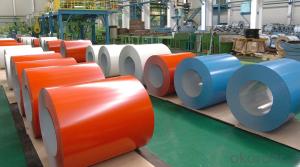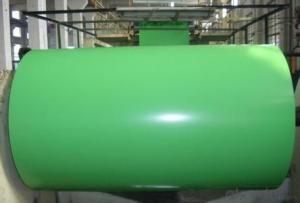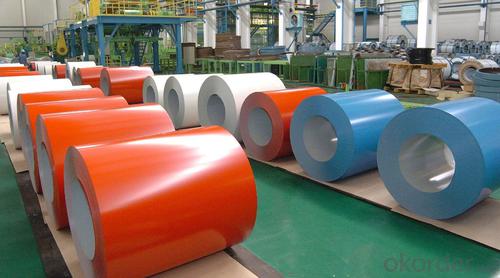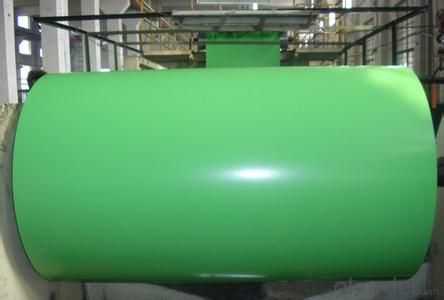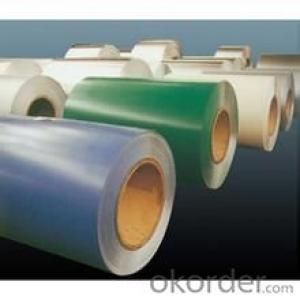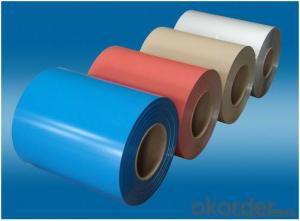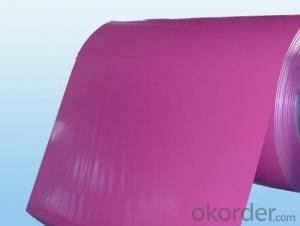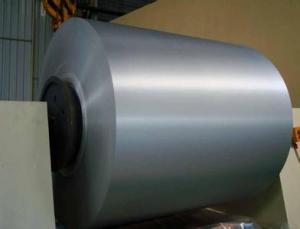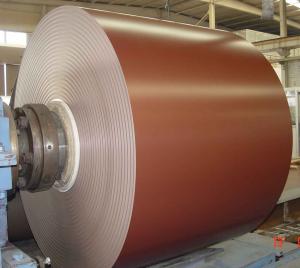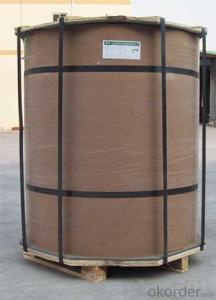032 Aluminum Coil - Prepainted Aluminum Coils 3xxx
- Loading Port:
- China Main Port
- Payment Terms:
- TT OR LC
- Min Order Qty:
- -
- Supply Capability:
- -
OKorder Service Pledge
OKorder Financial Service
You Might Also Like
Specifications
1.Thickness:0.2-4mm
2.Width:800-1900mm
3.excellent quality and reasonable price
4.fast delivery time
color coated aluminum coil
1.Thickness:0.2-4mm
2.Width:800-1900mm
3.excellent quality and reasonable price
4.fast delivery time
Color coated aluminum sheet/coil
| |
Alloy grade | 1050,1060,1100,3003,3004,3005,3105,5005,5052 ,5754 etc |
Hardness | 0,H12,H14,H16,H18,H22,H24,H26,H32,H34,H111, |
Thickness | 0.2-4mm |
width | 800-1900mm |
Popular size | 1000*2000,1200*2400,1219*2438,1220*2440 |
Color | white, gray ,gold ,blue, red, etc |
Coating | Polyester, Fluorocarbon, polyurethane and epoxy coating |
Application/use | Outdoor decoration, business chain, exhibition of advertisement decoration and display ,ACP, wall cladding, facades, roofs and canopies, ceilings, signboards, blind window, display platforms, electrical panels etc |
MOQ | 3-5 tons, negotiable |
Payment terms | T/T or L/C |
Delivery | About 15 days after receipt of deposit |
Package | Export standard package |
Kindly remind | Our machine can cut any size according to your requirement |
- Q: What is the process of manufacturing aluminum coils?
- Manufacturing aluminum coils encompasses a series of steps. Initially, aluminum ingots or scrap are melted at high temperatures in a furnace. The molten aluminum is then moved to a continuous casting machine to solidify it into a long, thin slab known as a billet. Following that, the billet is heated and passed through rolling mills to decrease its thickness and form it into a coil. Referred to as hot rolling, this process encompasses multiple passes through the rolling mills, gradually reducing the aluminum's thickness. After hot rolling, the coil may undergo additional processes depending on the desired end product. For example, it may go through cold rolling to further decrease thickness and enhance the aluminum's surface finish. Cold rolling also imparts specific mechanical properties such as increased strength and hardness. Subsequently, the coil may be subjected to various surface treatments like cleaning, etching, or coating to improve its appearance and protect it from corrosion. These treatments involve chemical processes or the application of protective coatings. Finally, the aluminum coil is typically cut into smaller lengths, known as sheets or strips, and packaged for shipment to customers. These sheets or strips may undergo further processing like fabrication or forming to meet specific customer requirements. Overall, the manufacturing process of aluminum coils involves melting and casting the aluminum, hot and cold rolling to shape and refine it, surface treatments for protection and appearance, and cutting and packaging for distribution.
- Q: Its got probably 330 horses right now with aluminum heads what do you think it be approx.
- everything being equal, aluminum heads will only make your engine lighter, not increase any horsepower. It's possible to buy aluminum heads that Will increase your horsepower, however the aluminum itself does nothing more than lower your weight. A lighter car moves easier.
- Q: Are aluminum coils resistant to UV radiation?
- Yes, aluminum coils are generally resistant to UV radiation. Aluminum has a natural oxide layer that provides protection against UV rays, making it highly durable and suitable for outdoor applications.
- Q: Can aluminum coils be used in electrical conductors?
- Yes, aluminum coils can be used in electrical conductors. Aluminum is a highly conductive metal, second only to copper in terms of electrical conductivity. It possesses excellent electrical properties, making it suitable for use in various electrical applications, including the production of coils. Aluminum coils are commonly used in electrical conductors for applications such as transformers, motors, generators, and power transmission lines. They are lightweight, cost-effective, and offer good thermal conductivity. However, it is important to note that aluminum has a lower tensile strength compared to copper, so proper design considerations must be taken into account to ensure the coil's stability and durability. Additionally, aluminum coils may require larger cross-sectional areas compared to copper coils to achieve the same electrical performance.
- Q: How do aluminum coils contribute to lightweight vehicle design?
- Aluminum coils play a crucial role in achieving lightweight vehicle designs due to their unique properties and manufacturing processes. Aluminum is a lightweight material itself, weighing about one-third of the weight of steel, making it an ideal choice for lightweight vehicle design. When aluminum is formed into coils, it provides several benefits that contribute to the overall weight reduction of the vehicle. Firstly, aluminum coils are highly formable, allowing complex shapes to be achieved using less material. This property enables automakers to design intricate body panels and structural components that are not only lightweight but also offer improved aerodynamics and fuel efficiency. The ability to form aluminum coils into intricate shapes also allows for increased design flexibility, leading to more innovative and visually appealing vehicle designs. Secondly, aluminum coils offer exceptional strength-to-weight ratio, making them an excellent choice for structural components. Despite being lightweight, aluminum coils provide excellent structural integrity, ensuring the vehicle's safety and durability. By incorporating aluminum coils into the vehicle's chassis, suspension systems, and other critical components, automakers can reduce weight while maintaining the necessary strength and rigidity required for safe operation. Furthermore, aluminum coils have excellent corrosion resistance, which is essential for the longevity of the vehicle. Corrosion can significantly impact a vehicle's structural integrity and overall performance. By using aluminum coils, automakers can reduce the risk of corrosion-related issues, leading to longer lifespan and reduced maintenance costs. Lastly, the use of aluminum coils helps in reducing the overall weight of the vehicle, resulting in improved fuel efficiency and reduced greenhouse gas emissions. Lighter vehicles require less energy to accelerate and maintain speed, leading to better fuel economy. This benefit is increasingly important as the automotive industry focuses on developing more sustainable and eco-friendly vehicles. In conclusion, aluminum coils contribute significantly to lightweight vehicle design by offering high formability, exceptional strength-to-weight ratio, corrosion resistance, and overall weight reduction. These properties enable automakers to design vehicles that are not only lighter but also safer, more fuel-efficient, and visually appealing. As the demand for lightweight vehicles increases, aluminum coils play a vital role in achieving these design goals.
- Q: How are aluminum coils used in the manufacturing of cookware?
- Aluminum coils are used in the manufacturing of cookware as they provide excellent heat conductivity, allowing for even and efficient cooking. These coils are shaped and formed into various cookware items like pots, pans, and baking sheets. The lightweight nature of aluminum ensures ease of handling and maneuverability for users. Additionally, the durability and corrosion resistance of aluminum make it a popular choice for cookware, ensuring long-lasting and reliable kitchen tools.
- Q: This question asks for a comparison between single-coil and multi-coil aluminum tubes, highlighting their differences.
- <p>Single-coil aluminum tubes are made with a single layer of aluminum wound into a cylindrical shape, offering simplicity and ease of manufacturing. They are typically used in applications requiring basic heat exchange or formwork. In contrast, multi-coil aluminum tubes consist of multiple layers of aluminum wound together, which can provide greater strength and durability. They are often utilized in more demanding applications where higher pressure resistance and thermal efficiency are required, such as in high-performance heat exchangers or industrial processes. The multi-coil design also allows for better heat distribution and can handle more stress without deformation.</p>
- Q: Can aluminum coils be used in outdoor or exposed applications?
- Yes, aluminum coils can be used in outdoor or exposed applications. Aluminum is known for its excellent corrosion resistance, which makes it suitable for outdoor use. It forms a protective oxide layer on the surface that prevents further oxidation. Additionally, aluminum is lightweight, durable, and has a high strength-to-weight ratio, making it a popular choice for outdoor applications where weight and durability are important factors. Aluminum coils are often used in outdoor applications such as HVAC systems, roofing, gutters, and siding, as they can withstand exposure to various weather conditions without compromising their performance or appearance.
- Q: How does the alloy composition affect the properties of aluminum coils?
- The alloy composition significantly affects the properties of aluminum coils. Different alloy compositions can alter the coil's strength, corrosion resistance, electrical conductivity, and thermal conductivity. For example, adding elements like copper or magnesium can enhance the coil's strength and improve its ability to withstand high temperatures. On the other hand, alloying elements like silicon or manganese can improve the coil's corrosion resistance. Consequently, the choice of alloy composition is crucial in determining the suitability of aluminum coils for specific applications.
- Q: Are aluminum coils fire-resistant?
- Yes, aluminum coils are fire-resistant. Aluminum has a high melting point of 660 degrees Celsius (1220 degrees Fahrenheit) and it does not burn, making it a non-combustible material. This property makes aluminum coils suitable for various applications where fire resistance is a critical factor, such as in building construction, electrical wiring, and HVAC systems. Additionally, aluminum's excellent heat conductivity helps dissipate heat quickly, reducing the risk of fire. However, it is important to note that while aluminum coils themselves are fire-resistant, they may be used in systems that include other components which may not have the same level of fire resistance. It is important to consider the entire system and follow proper fire safety regulations and guidelines to ensure overall fire safety.
Send your message to us
032 Aluminum Coil - Prepainted Aluminum Coils 3xxx
- Loading Port:
- China Main Port
- Payment Terms:
- TT OR LC
- Min Order Qty:
- -
- Supply Capability:
- -
OKorder Service Pledge
OKorder Financial Service
Similar products
Hot products
Hot Searches
Related keywords
